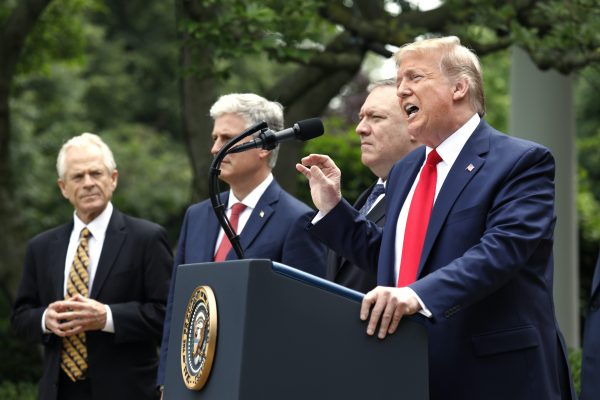There have been a series of rhetorical attacks directed at the CCP from high-ranking US officials since late June. National Security Adviser Robert O’Brien, FBI Director Christopher Wray, Attorney General William Barr and Secretary of State Mike Pompeo have been dubbed the ‘four horsemen of the apocalypse’ tasked by Trump to overthrow the CCP. The Trump administration has taken concrete actions to decouple bilateral relations by closing the Chinese Consulate General in Houston, sending Health Secretary Alex Azar to Taiwan and attempting to ban Chinese social-media giants TikTok and WeChat in the United States.
China’s reactions have been surprisingly conciliatory given its reputation for ‘wolf warrior’ diplomacy and tit-for-tat actions against the United States. In an interview with Xinhua on 5 August, China’s Foreign Minister Wang Yi firmly rejected the idea of a new Cold War and proposed easing current tensions through dialogue ‘at any level, in any area and at any time’.
Two days later Yang Jiechi, Director of the Office of Foreign Affairs of the CCP, published an article titled ‘Respect History, Look to the Future and Firmly Safeguard and Stabilise China–US Relations’. Yang praised the legacy of US engagement with China — pioneered by the Nixon administration — and called for more ‘mutually beneficial cooperation in all fields’.
China’s goodwill diplomacy seems too little too late because no one in the Trump administration is taking it seriously. Beijing’s call for dialogue is falling on deaf ears in Washington in part because any such communication is seen as ‘diplomatic kowtowing’ by the United States.
But this interpretation of Chinese diplomacy seems overly simplistic. Chinese culture and history offer a better way to understand the three messages China intends to convey to salvage relations with the United States.
First, China does not want a Cold War with the United States. Wang Yi remarked that ‘China was not the former Soviet Union and it had no intention of becoming another United States’. This might be wishful thinking from the CCP, but it takes two to tango, and China has informed the United States that it will avoid the ‘Cold War trap’ that ensnared the Soviet Union and the United States.
Wang and Yang highlighted the good old days of US–China relations after Richard Nixon’s 1972 visit to remind their US counterparts that the two countries co-existed by transcending their ideological differences. This is a Tai-Chi-like response to the punches thrown by the ‘four horsemen’.
The second message is that the United States is unable to wage this Cold War alone. China wants to make it clear to US allies — including ‘five-eyes’ countries Australia, New Zealand, the United Kingdom and Canada — that it has no intention to fight a new Cold War with the United States. By striking a conciliatory tone, China aims to reduce the likelihood of the United States building a coalition against it. China’s ‘anti-Cold War’ effort can also be seen in Wang Yi’s recent visits to five European countries.
Other interested countries — especially US allies — will need to choose whether to turn the Cold War into a reality or treat it as an illusion of the four horsemen. While the Trump administration is trying to ‘checkmate’ China through short-term confrontation, Chinese leaders are playing a game of ‘Go’ insofar as they are seeking to position themselves for future advantages. This avoids direct confrontation in a game of high stakes, even if it forsakes short-term gains.
The third and final message is a warning to the international community about the danger of a potential conflict between the United States and China. There are worries about the ‘guns of August’ in the Asia Pacific — any strategic miscalculation or military accident might trigger a hot and potentially nuclear conflict in the South China Sea, East China Sea or over the Taiwan Strait.
China’s top diplomats have made it clear that China’s red line is CCP rule. The recent visit by US Health Secretary Azar to Taiwan may have led to Chinese military exercises around the Taiwan Strait as well as the ‘carrier killer’ missile test in the South China Sea . In Confucian culture, a country is expected to lose in battle if it lacks high standards of morality. An early and sincere call for international cooperation during the pandemic is potentially China’s way of taking the moral high ground in preparation for something more heated with the United States.
Will China’s messages cut through to the United States? Will China behave according to the gentle signals it is trying to convey? The coming months before the US election will be critical for US–China relations. It is time for the United States and China to work together to avoid a real, even if accidental, apocalypse.
Kai He is Professor of International Relations at the Griffith Asia Institute and the Centre for Governance and Public Policy, Griffith University.

